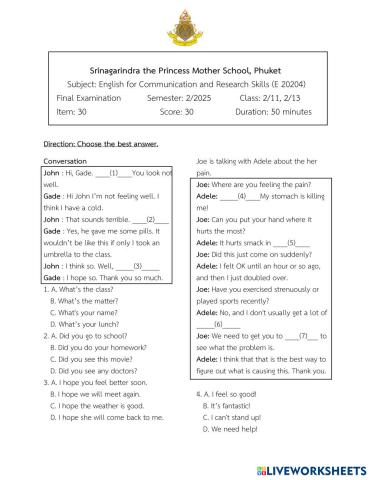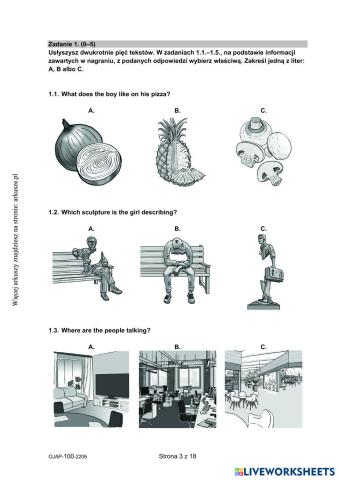Created by

Angie0126
-
ภาษาอังกฤษ
-
มัธยมศึกษาตอนต้น
-
ม.2 (มัธยมศึกษาปีที่ 2)
-
การอ่านและการวิเคราะห์ข้อความ
-
Spanish
คำแนะนำของผู้เขียน
Theoretical Framework
🔹 What is Conflict?
A conflict is a disagreement or struggle between people or groups caused by different interests, needs, values, or goals. Conflicts are natural, but the way we handle them determines whether they have positive or negative consequences.
“Conflict is inevitable, but violence is not.” – Johan Galtung (Peace Theorist)
🔹 Types of Conflict:
- Interpersonal: Between individuals (e.g., classmates, friends, family).
- Social/Community: Between groups or sectors of society (e.g., protests, discrimination).
- Internal: Within oneself (e.g., moral dilemmas, decisions).
- Political/Citizen-State: Related to the exercise of rights, inequality, and social justice.
🔹 Why Do Conflicts Arise?
- Lack of communication
- Misunderstanding or stereotypes
- Violation of rights
- Inequality or exclusion
- Power struggles
- Cultural differences
🌍 2. Conflict and Citizenship
A good citizen doesn’t avoid conflict, but works to resolve it respectfully and fairly.
In a democratic society, citizens have both rights and responsibilities. When conflicts arise, solutions must be based on:
- Human rights: Everyone deserves respect, safety, and dignity.
- Social values: Respect, tolerance, solidarity, justice, responsibility.
Created by

Angie0126
-
ภาษาอังกฤษ
-
มัธยมศึกษาตอนต้น
-
ม.2 (มัธยมศึกษาปีที่ 2)
-
การอ่านและการวิเคราะห์ข้อความ
-
Spanish
คำแนะนำของผู้เขียน
Theoretical Framework
🔹 What is Conflict?
A conflict is a disagreement or struggle between people or groups caused by different interests, needs, values, or goals. Conflicts are natural, but the way we handle them determines whether they have positive or negative consequences.
“Conflict is inevitable, but violence is not.” – Johan Galtung (Peace Theorist)
🔹 Types of Conflict:
- Interpersonal: Between individuals (e.g., classmates, friends, family).
- Social/Community: Between groups or sectors of society (e.g., protests, discrimination).
- Internal: Within oneself (e.g., moral dilemmas, decisions).
- Political/Citizen-State: Related to the exercise of rights, inequality, and social justice.
🔹 Why Do Conflicts Arise?
- Lack of communication
- Misunderstanding or stereotypes
- Violation of rights
- Inequality or exclusion
- Power struggles
- Cultural differences
🌍 2. Conflict and Citizenship
A good citizen doesn’t avoid conflict, but works to resolve it respectfully and fairly.
In a democratic society, citizens have both rights and responsibilities. When conflicts arise, solutions must be based on:
- Human rights: Everyone deserves respect, safety, and dignity.
- Social values: Respect, tolerance, solidarity, justice, responsibility.
สำรวจแผ่นงาน
Malala's Timeline
- English Language
- 8th grade
Final Examination M.2 2/2025
- English Language
- 8th grade
GUÍA 3 - Unos, otros... ¡Nosotros! (SEGUNDA PARTE - GRADO 8)
- English Language
- 8th grade
e8.3
- English Language
- 8th grade
 อยากได้แบบฝึกหัดฟรีนับพัน (ไม่มีสิ่งรบกวนเลย)?
อยากได้แบบฝึกหัดฟรีนับพัน (ไม่มีสิ่งรบกวนเลย)?















